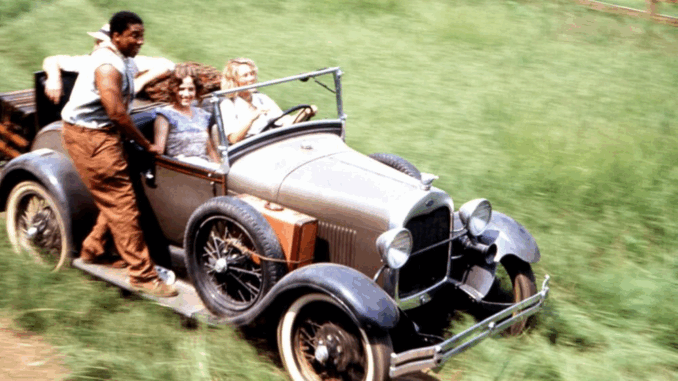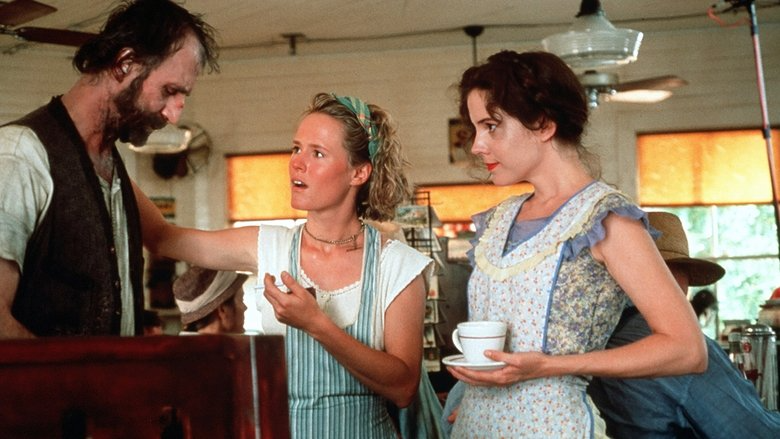
If you ever wondered what might have been, this is for you. Fried Green Tomatoes captured hearts with its Southern charm, friendship, and unforgettable characters. For years, rumors surrounded a sequel titled Return to Whistle Stop. It would’ve brought back Evelyn, Idgie, and Ruth with a brand-new mystery after Ninny’s passing. But despite excitement from fans and interest from the original cast, the sequel never came to life. Let’s explore what happened behind the scenes and why Whistle Stop’s story was left untold.
1. The Sequel That Almost Happened
The idea for Return to Whistle Stop began in the early 2000s. The story was set many years later, with Evelyn returning to her old town after Ninny’s death. There, she would uncover a hidden truth about Idgie and Ruth that had never been revealed.
The film’s author and creative team developed the concept with the goal of recapturing the emotional tone of the original. Kathy Bates and Mary Stuart Masterson both expressed interest in reprising their roles. Fans were thrilled at the idea of seeing the Whistle Stop Café reopen for another chapter.
2. Why Hollywood Said No
The biggest obstacle was studio skepticism. Executives doubted that a film about middle-aged Southern women could draw enough audience interest. At the time, the industry favored action-packed blockbusters and youth-oriented dramas. A heartfelt, nostalgic sequel didn’t seem “commercial” enough.
Financial risk was another major issue. Character-driven stories without major special effects or modern appeal were considered risky investments. Over time, the enthusiasm around the project faded, and Return to Whistle Stop quietly disappeared from Hollywood’s schedule.
3. The Story Lived On in a Different Way
Although the film never materialized, the story of Whistle Stop continued in another form. Fannie Flagg, the author of Fried Green Tomatoes at the Whistle Stop Café, later wrote a sequel novel titled The Wonder Boy of Whistle Stop. The book revisits Buddy Jr., now an old man reflecting on the past and the people who shaped his life.
Years later, a new project inspired by the film was proposed — a modern television series starring Reba McEntire. The concept followed Idgie returning to a changed Whistle Stop, balancing a failing café and a complicated relationship with her daughter. While exciting, this adaptation has not yet moved forward into production.

4. What Made the Sequel So Difficult to Produce
Creating a sequel decades after the original posed several challenges. The film relied heavily on chemistry between the cast, the warm tone of the story, and its period setting. Recreating that charm was no easy task.
There was also the issue of timing. As years passed, audience tastes shifted, actors aged, and studio priorities changed. Without strong financial support, projects like Return to Whistle Stop often get pushed aside in favor of more “profitable” genres.
5. What the Cast and Author Said
Fannie Flagg admitted she never initially planned a sequel but felt the characters still had more to say. She believed people needed stories of hope and community — something Whistle Stop always represented.
The original cast members, including Kathy Bates, expressed affection for their roles and openness to return if a sequel happened. For many fans, their chemistry and authenticity were what made the original film timeless.
6. Could It Still Happen One Day?
Today’s streaming platforms are more open to nostalgic revivals. Audiences have embraced stories centered on women, friendship, and regional culture. It’s not impossible that Return to Whistle Stop could find a new home through Netflix, Prime Video, or another service willing to take the creative risk.
The appetite for authentic storytelling and familiar characters is stronger than ever. If there’s ever a time for Whistle Stop to make its comeback, it’s now.
7. Why Its Cancellation Still Hurts
The decision not to move forward with Return to Whistle Stop feels unfair to many fans. It reflected an outdated belief that stories about older women couldn’t succeed. Yet, the enduring love for Fried Green Tomatoes proves otherwise.
Audiences continue to celebrate its themes of loyalty, courage, and female friendship. These values never go out of style, and perhaps that’s why the movie remains a cultural touchstone decades later.
8. The Power of Nostalgia and Connection
Nostalgia plays a powerful role in why people still talk about Whistle Stop. The original film wasn’t just about a small town — it was about belonging, kindness, and the bonds we form over time.
Fans often say that rewatching the movie feels like visiting old friends. That emotional connection is exactly why the story deserves another chance, whether through a sequel, series, or special reunion.
9. Lessons from Return to Whistle Stop
There’s a lesson in every lost project. The story of this unmade sequel reminds us that timing matters, passion matters, and so does believing in stories that celebrate humanity over spectacle.
Sometimes the world isn’t ready for a story — but that doesn’t mean the story isn’t worth telling. Whistle Stop may be quiet for now, but as long as people keep revisiting the café in their hearts, its spirit lives on.
Return to Whistle Stop might never have reached the screen, but its story continues to inspire. The heart of Fried Green Tomatoes — friendship, resilience, and love — still burns bright. Whether through novels, fan dreams, or future adaptations, Whistle Stop remains a symbol of hope.
Maybe one day, the café doors will open again, and we’ll hear the laughter, the sizzle of green tomatoes, and the stories that made us fall in love all over again.
